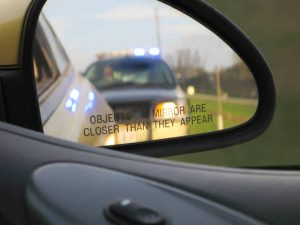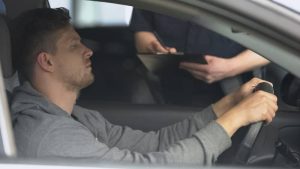A traffic stop can be a moment filled with uncertainty. It’s natural to feel anxiety when you see flashing blue lights in your  rearview mirror.
rearview mirror.
However, understanding your legal rights can transform this nerve-wracking experience.
Coupled with some advance preparation, such as having key documents readily available, you can confidently navigate the situation and ensure your rights are protected.
A lot of people have questions like:
- What is required to pull you over? Reasonable Suspicion or Probable Cause?
- Should you try to talk your way out of a ticket?
- Is it better to answer questions or stay silent?
- Are you required to consent to a search of your vehicle?
This article aims to demystify some of these questions about traffic stops in North Carolina and provide clarity on your legal rights and options.
If you’ve been pulled over, we may be able to help. Don’t just pay off a ticket or plead guilty. Talk to a lawyer before you do anything – Bill Powers, Traffic and DWI Lawyer in NC
Reasonable Suspicion vs. Probable Cause
Two foundational concepts in American criminal jurisprudence, reasonable suspicion and probable cause, often play significant roles during traffic stops.
Do you need a lawyer for a Traffic Ticket?
Reasonable suspicion is the legal standard that allows officers to initiate a stop. This standard doesn’t require absolute certainty of wrongdoing but instead hinges on “specific and articulable facts” that suggest a crime is “afoot.” A burnt-out taillight or erratic swerving can serve as bases for such stops.
On the other hand, Probable Cause is a higher threshold. For an officer to make an arrest, conduct a search without consent, or obtain a search warrant, they must possess facts or evidence suggesting reasonable grounds to believe someone has been involved in a crime. This might be the odor of illegal substances or visible contraband in a car.
It’s Nice to be Nice: The Dynamics of Politeness
The adage, “You catch more flies with honey than with vinegar,” holds weight during traffic stops.
While the law doesn’t explicitly penalize discourtesy, a hostile attitude can complicate matters and carry the potential for long-term consequences.
Police Tactics Before an Arrest: Making a Case
Rudeness breeds contempt and a reciprocated bad attitude.
Officers are human. They expect a certain level of politeness, even if they’re not being particularly friendly themselves – Bill Powers, NC Lawyer
If you’re intentionally rude to someone, including police officers, logic dictates that they’re not going to go out of their way to be polite or helpful.
Officers may become more meticulous, potentially prolonging the stop or increasing tension.
Although maintaining civility can make the experience smoother, it’s essential to balance politeness with an awareness of one’s rights.
Consenting to Searches: The Freedom to be Left Alone
One right drivers should be acutely aware of is their Fourth Amendment protection against unreasonable searches and seizures.
Without a warrant, probable cause, or the driver’s consent, an officer often cannot search a vehicle.
If an officer requests permission to look inside your car, that’s a pretty good indicator they don’t have Probable Cause to search. Even if they pressure you, it’s often better to decline a search of your vehicle – Bill Powers, Criminal Defense Lawyer in NC
When you decline to consent to search, there is no reason or need to provide an excuse or explanation.
Indeed, don’t engage in a conversation on the subject. Be clear in your assertion of your 4th Amendment Right.
A simple “I do not consent to a search” suffices.
Stop Talking: It’s in your best interest
Communicating during a traffic stop is an art.
While drivers should always provide identification, registration, and insurance information, they should approach other questions with caution.
While there’s no mandate to remain entirely silent, it’s often in the driver’s best interest to limit conversation – Bill Powers, Criminal Defense Lawyer Charlotte NC
The Fifth Amendment provides individuals the right to avoid self-incrimination, so feel free to politely decline to answer questions you deem potentially incriminating.
Expedite the Police Encounter: Have Your License, Insurance, and Registration at the Ready
A smooth traffic stop often begins with preparation.
What is Probable Cause: A Deep Dive into NC Criminal Law
Before an officer approaches, having your driver’s license, vehicle registration, and proof of insurance at the ready can be beneficial.
This readiness not only displays a willingness to cooperate but can also expedite the stop.
Emerging Technologies and Your Rights: Smile, You’re on Candid Camera
As technology progresses, so does its presence during traffic stops.
The use of Body Worn Cameras (BWC) in North Carolina is now common in many jurisdictions. But for the North Carolina State Highway Patrol (State Troopers), many, if not most, police agencies in the Charlotte-Metro region now record both audio and video using BWC devices.
The Charlotte Mecklenburg Police Department Body Camera Policy
Body cameras can offer objective accounts of police encounters, which can serve as a two-edged sword.
While camera evidence may provide a legal basis to challenge the basis of a stop or arrest, video recordings are now very much part of the State’s evidence in the prosecution of legal matters.
Being aware of an officer’s obligation to record can provide reassurance, but also note that you, too, often have the right to record as long as it doesn’t interfere with the officer’s duties.
DUI Stops: What you need to know
Impaired Driving checkpoints and stops have added layers of complexity.
Field Sobriety Tests: Are Dexterity Tests Fair?
North Carolina’s implied consent law means that by using state roads, you’ve already consented to blood, breath, or urine tests for impairment if suspected of impaired driving.
Refusing the evidentiary tests can carry consequences, including license suspension.
The roadside field screening test, the AlcoSensor, does not result in a license revocation.
A Willful Refusal is not a separate criminal charge in North Carolina, but it does carry some pretty serious consequences.
Similarly, refusing to submit to the roadside AlcoSensor FST (field screening test) and SFSTs – Standardized Field Sobriety Tests is not required.
At the same time, refusing to blow into the portable breath testing device and/or take the dexterity tests may be used as a legal basis to establish Probable Cause to Arrest for DWI in North Carolina. 
NOTE: Failing to submit to the EC/IR II Intoximeter or blood sampling and/or urine test when required under the NC DWI Laws (the Implied Consent Law), can result in the immediate and mandatory revocation of your license.
Understanding Passenger Rights
Often overlooked are the rights of passengers during traffic stops. Like drivers, passengers are protected against unreasonable searches and seizures and have the right to remain silent.
Unless officers have reasonable suspicion to detain passengers, they may be free to leave. Whether passengers are required to identify themselves and/or provide ID is another, complicated legal issue.
The Powers Law Firm: Your Advocates for Justice
In a society governed by the rule of law, understanding one’s rights and responsibilities, especially during moments as critical as traffic stops, is paramount.
This understanding not only safeguards individual liberties but also ensures the efficient functioning of our justice system. 
When in doubt, always consider reaching out to an experienced traffic lawyer to discuss the intricacies of your specific situation. Each case, like each person accused of a traffic matter, criminal charge, or DUI in North Carolina is unique.
That’s why it makes sense to consult a lawyer if you’ve been arrested or charged with a traffic citation.
Helpful Information About Traffic Stops and Criminal Charges
- FAQs in North Carolina: DWI/DUI and “Drunk Driving”
- The Truth about DUI Charges in North Carolina
- How long is your license suspended?
- What are the Open Container laws in NC?
- Are there differences between DWI and DUI?
- Is Reckless Driving the same thing as Careless Driving?
- What you need to know about Insurance and Tickets
- Traffic Ticket FAQs
- PODCAST: What to do if you receive a Traffic Ticket in North Carolina
 Carolina Law Blog
Carolina Law Blog